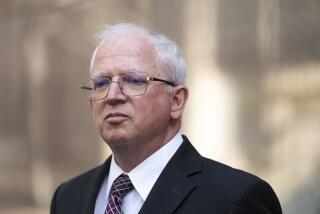How Pure Can Independent Counsel Be?
- Share via
WASHINGTON — In considering the criticisms leveled against Whitewater independent counsel Kenneth W. Starr, remember the question posed by the great philosopher Henny Youngman, “How’s your wife?” His answer: “Compared to what?”
Starr’s critics say he is too partisan to be trusted with investigating President Bill Clinton. They ask, in swelling chorus, “Is the independent counsel independent?” This deserves the Youngman-esque response: “Independent of what?” But the answer to this last question keeps changing, according to the needs of the independent counsel’s political opponents.
During Watergate, special prosecutors appointed by the Nixon administration successfully caused President Richard M. Nixon’s resignation. Yet, Nixon’s opponents, instead of exulting that the system worked, said there was grave danger in the fact that the president held any authority over these officials. So Congress designed the independent counsel to be as radically independent of the executive branch as the mind of man could conceive. Federal judges would choose the counsel. In office, he or she would, for all practical purposes, be unremovable.
The design worked. Independent counsels, chosen from the private sector, owe no allegiance to sitting administrations. Presidents cannot exercise influence over independent-counsel investigations.
So are we happy? Of course not. Now that Clinton (a definite Democrat) is being investigated by Starr (a palpable Republican), parts of political Washington see that the independent counsel’s freedom from presidential influence is inconvenient. They attack the problem by arguing that independence from the executive is not enough. Private-sector influences, they say, can also compromise an independent counsel’s independence.
Starr is a tough case for the mistrust-meisters. Though clearly Republican, he is no spear carrier. In high-profile government posts--as a federal appeals-court judge and as solicitor general--Starr established an extraordinary bipartisan reputation for fairness and probity. In the Whitewater investigation, according to Democrats on the inside, Starr has not done anything that would change this reputation. They say he operates apolitically, decisions are made by staff consensus and care is taken to avoid bias.
There is no real evidence otherwise. Starr’s investigation has spawned conventional protests from affected parties about alleged excesses of prosecutorial enthusiasm, but that’s about it.
In the past few weeks, Democratic politicians and journalists have lodged a string of complaints against Starr: He argued a case in support of school vouchers, which Clinton opposes; he represents tobacco companies, which Clinton threatens; a pal of Sen. Bob Dole’s is a client; Starr’s law firm recently settled a suit by the Resolution Trust Company, which is involved in the independent counsel’s investigation.
Perhaps more to the point is the charge that Starr hangs out with an anti-Clinton crowd: the school-voucher case was partly financed by the “archconservative” Bradley Foundation; Starr is on the legal advisory board of the conservative Washington Legal Foundation, and a good friend of Starr’s represents David Hale, who has accused then-Gov. Clinton of exerting improper political pressure.
Starr’s critics say or imply that he is unprecedentedly partisan. Some call on him to step down; others intimate that he is in deep ethical and political trouble. The White House, with increasing openness, cheerfully feeds the journalistic flock now gathering around the issue.
Starr’s critics have not done him much substantive damage. Most do not say he has done anything illegal or unethical. They don’t say his client list or choice of friends is improper or involves him in professional conflicts of interest as independent counsel. They just say his associations give off a bad appearance. In this view, independent counsels are not independent if they are more than nominally Republican or Democratic, if their connections are consistently liberal or conservative or if they have represented people with policy agendas opposed to those of their investigative targets.
Most of this criticism is opportunism. Independent counsels before Starr maintained active practices--including clients who were not favorites of the incumbent administrations. We did not hear protests. As for partisan pasts, we have already had an independent counsel--Whitney North Seymour Jr.--who was not a mere partisan activist but had actually been an elected official. Nobody screamed.
The serious version of the argument against Starr is that an independent counsel should be free of connections with people or policies unfriendly to his investigative targets. But the statute’s drafters had roughly the opposite idea. Independent counsels were supposed to come from outside government. This meant they would have private practices and the lives of private citizens. This was their insurance--and ours--against corrupting pressure by the executive.
Now it is said that independent counsels with such ties cannot be trusted, even when they demonstrate fairness in their duties. Well, what’s wrong with that proposition? Why shouldn’t we raise our sights and add a “no partisanship in personal life” rule to the requirements?
While the sentiment seems worthy, adding this standard would not end such disputes. For example, independent counsels have been active in religious or ethnic organizations. We don’t call such groups “partisan.” But what happens when a devout anti-abortion Catholic investigates a pro-choice president? Does anyone doubt someone will charge bias?
Another example: As we narrow the range of independent-counsel candidates, we will have counsels whose experience is heavily prosecutorial. When they act aggressively, do we doubt that allies of the investigated officials will demand counsels more independent of prosecutorial bias? Conversely, if an independent counsel’s experience is on the defense, why shouldn’t critics demand he or she be replaced by someone who isn’t psychologically in the pocket of white-collar criminals?
In other words, there will always be a category that critics can use to delegitimate an investigation. That is why the idea of an independent counsel, operating under special rules that would guarantee independence and have universal acceptance, was self-defeating from the start. More important, that is why the proper standard on which to judge a counsel’s independence, or any prosecutor’s independence, is the standard of his or her actual conduct in office.
A disinterested advisor to Starr would advise him to take some symbolic step--like separating himself from some of his current cases--that responds to his political critics. The reason, though, is not that they have got him on the merits; it is that they will never stop trying.*
More to Read
Get the L.A. Times Politics newsletter
Deeply reported insights into legislation, politics and policy from Sacramento, Washington and beyond. In your inbox twice per week.
You may occasionally receive promotional content from the Los Angeles Times.








